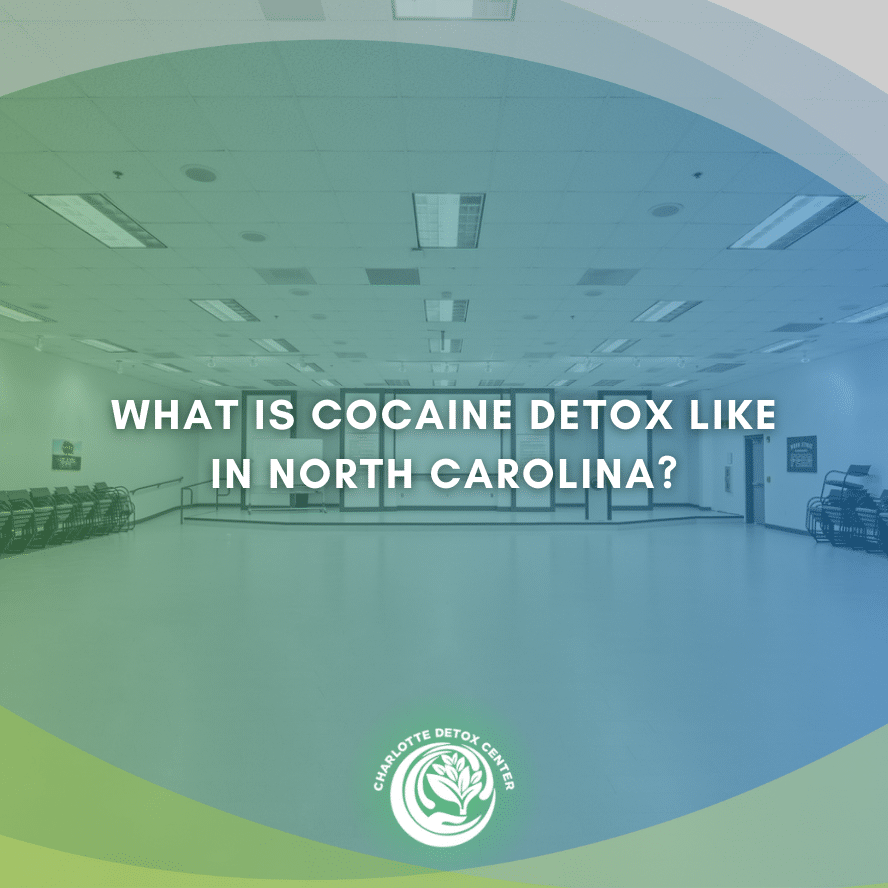What is Cocaine Detox Like in North Carolina?

Medically Verified: 2/1/24
Medical Reviewer
Chief Editor

All of the information on this page has been reviewed and verified by a certified addiction professional.
Cocaine is a powerful illicit stimulant drug that is derived from coca leaves found in South America. More than 100 years ago, cocaine was isolated from the plant, creating the addictive drug we know today. In the early 1900s, cocaine was actually used to create tonics and elixirs that treated a variety of illnesses.[1]
Now, cocaine is rarely used medicinally in any way due to its extremely addictive nature. It can be applied by a physician to be used in anesthesia before surgery. However, most cocaine use in the United States is illegal and is done on the streets or nightclubs. When someone abuses cocaine, their body quickly becomes dependent on it, causing individuals to experience withdrawal symptoms when they stop using the drug.
The withdrawal symptoms associated with cocaine addiction can be very distressing. Unfortunately, many people who attempt to quit using cocaine on their own end up relapsing to soothe their symptoms of withdrawal, but a cocaine detox center can prevent people from experiencing the severe effects of withdrawal and maintain long-term sobriety.
The Symptoms of Cocaine Withdrawal
While cocaine produces an intense and euphoric rush, the high is short-lived and cocaine has a short half-life. As a result, many people binge on the drug to avoid experiencing the withdrawal symptoms that follow brief periods of abstinence. Binging on cocaine in this manner can lead to overdose.
Symptoms of cocaine withdrawal include:
- Trouble concentrating
- Slowed activity and thinking
- Hostility or bouts of anger
- Depression
- Anxiety
- Vivid dreams or nightmares
- Paranoia
- Suicidal thoughts or actions
- Increased cravings for cocaine
While the symptoms of cocaine withdrawal are not as physically severe as other forms of drugs like alcohol or benzodiazepines, the psychological symptoms can be extremely dangerous. Symptoms like extreme mood swings and or suicidal ideation may occur.
What to Expect During Cocaine Detox in North Carolina
Cocaine detox is a process in which drugs are naturally removed from a patient’s body. During detox, medications and treatments are used to soothe the symptoms of withdrawal and prevent intense cravings. This helps patients focus on staying sober, rather than causing them to seek out substances to soothe their symptoms of withdrawal.
Symptom Management
There are currently no medications that have been approved by the FDA to treat cocaine withdrawal, but some research has found that drugs like modafinil and amantadine can help manage the symptoms.[2]
Some medications can directly target some of the symptoms individuals will experience. For example, medications can be given to improve the symptoms of headaches, insomnia, or depression during the detox process. This ensures that patients are not experiencing these symptoms severely.
During the first 24 to 36 hours, most patients will catch up on sleep that they missed during their stent with active cocaine addiction. Most patients feel hungry and will eat large portions of food to make up for the nutritional deficiencies they had upon arriving at the facility.
Holistic Treatments
Once a patient is feeling well enough to engage in activities, they can engage in holistic treatments to manage their remaining symptoms. Holistic treatments are therapeutic methods that treat the “whole person” and natural forms of treatment rather than medications.
Examples of holistic treatments for cocaine withdrawal include:
- Exercise
- Acupuncture
- Meditation
- Yoga
- Massage
- Nutrition
- Hydration
- Sauna and hot baths
- Art and music therapy
These treatments promote relaxation, and anxiety relief, as well as provide patients with a fun distraction from their withdrawal symptoms.
24/7 Mental Health Support
Cocaine withdrawal is known to cause some pretty significant mental health symptoms. For example, some people can become extremely depressed and suffer from thoughts of self-harm or suicide. Because of this, it is of the utmost importance that patients are provided with efficient mental health support.
Many people choose to detox from cocaine at a residential facility. This means that patients live at the facility throughout their stay. This allows the mental health experts on staff to provide each patient with support whenever they need it.
If a patient is having a hard time in the middle of the night, there will be a qualified therapist on site that can speak with them and talk them through their problems.
Medical Stabilization
During detox, patients may experience health symptoms such as increased heart rate or blood pressure. This can be extremely distressing, especially if their heart rate rises too much.
The medical team at a cocaine detox center in North Carolina will monitor each patient’s vital signs regularly to ensure that they do not experience any medical emergencies, and if they do, they will receive prompt treatment to correct the issue.
Vital signs that are monitored include:
- Body temperature
- Pulse rate
- Respiration rate (rate of breathing)
- Blood pressure
Before leaving detox, patients will meet with a substance abuse counselor to get help choosing a local cocaine addiction treatment program.
Get Connected With a Top-Rated Cocaine Detox Center in North Carolina
If you or a loved one suffer from cocaine addiction, it’s time to seek help. At Charlotte Detox Center, our skilled and experienced medical and therapeutic staff are trained to provide care and support for sufferers of substance use disorders as well as their families. Each client has their own beautifully appointed private room in which to rest, relax and rejuvenate.
Don’t wait any longer to get the help you need. Call now to start your recovery.
References:
